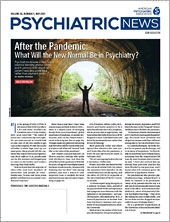Southern trees bear a strange fruit
Blood on the leaves and blood at the root
Black bodies swingin' in the Southern breeze
Strange fruit hangin' from the poplar trees
—excerpt from “Strange Fruit,” made famous by Billie Holiday
The execution of Black people at the hands of the police is the modern-day version of 19th and 20th century lynchings—where Black bodies hung from trees for the world to see. Lynchings were meant to control “freed Blacks,” instilling fear and despair. Similarly, today there is a collective anguish in the Black community as we are repeatedly exposed to media images of Black people being killed by the police.
With the trial of Derek Chauvin (known in many Black spaces as simply “the trial”) now under way, we are reliving the horror of George Floyd’s death—through the replaying of raw video footage, witness and expert testimony, and the defense offered by Chauvin’s attorneys.
The constant replaying of raw video footage of George Floyd’s death harkens deep-seated agony, as we globally bear witness to the harmful ills of overt racism.
Vicarious trauma—the emotional and physical experiences that can arise from witnessing the pain of others, in this case the killing of George Floyd—is triggering for many Black people. Additionally, as Chauvin’s defense attorneys assassinate Floyd’s character to provide justification for the stark injustice, there is growing fear among Black people that such messages could serve to embolden racist police.
With the coverage of the Chauvin trial at great heights in the mainstream media, some may experience symptoms closely related to posttraumatic stress disorder including (1) intrusive symptoms (bodily cues like an increased heart rate connected to the triggering event), (2) avoidance (not watching the trial because it brings up memories of the traumatic event), (3) negative changes in mood (feeling detached from others, inability to experience joy) and (4) changes in arousal (difficulty concentrating, always being “on guard”).
How do we as psychiatrists—many of whom will never share the understanding of personally mediated racism at the hands of the police—provide healing care to those who are experiencing this trauma? What is the way forward in supporting our patients who are indeed being personally and peripherally affected by the vicarious trauma during “the trial”?
There are many ways forward, but we must be deliberate in acknowledging the grave injustices related to Black identity in America. We cannot shy away from the realities that Black people are more likely to suffer negative consequences, including death, at the hands of the police than non-Black people in this country. Bringing this reality into the treatment milieu can help to affirm the very real and harmful experience of racism.
Secondly, we can silently bear witness to the pain associated with this experience and simply listen—without rushing to offer solutions. Being seen and heard are essential in healing, and many Black people simply need a place to do both.
Finally, we can encourage patients to practice acts of self-preservation—such as engaging in prayer and meditation—and join in community healing—through participation in all-Black spaces such as virtual emotional emancipation circles and Sawubona healing circles.
As psychiatrists, we can play a major role in helping those most adversely impacted by the Derek Chauvin trial access true liberation and wellness. We must position ourselves to lead this effort now and during other difficult times when people encounter injustice. ■

